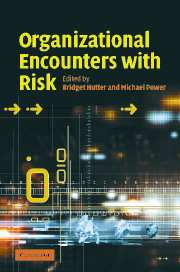Book contents
- Frontmatter
- Contents
- List of tables
- Notes on contributors
- Acknowledgements
- List of abbreviations and acronyms
- 1 Organizational encounters with risk: an introduction
- 2 Organizational rituals of risk and error
- 3 ‘Ways of seeing’: understandings of risk in organizational settings
- 4 Risk and rules: the ‘legalization’ of medicine
- 5 Organizational responses to risk: the rise of the chief risk officer
- 6 Incentives, risk and accountability in organizations
- 7 Mathematizing risk: models, arbitrage and crises
- 8 Interdependencies within an organization
- 9 Restoring reason: causal narratives and political culture
- Bibliography
- Name index
- Subject index
7 - Mathematizing risk: models, arbitrage and crises
Published online by Cambridge University Press: 22 September 2009
- Frontmatter
- Contents
- List of tables
- Notes on contributors
- Acknowledgements
- List of abbreviations and acronyms
- 1 Organizational encounters with risk: an introduction
- 2 Organizational rituals of risk and error
- 3 ‘Ways of seeing’: understandings of risk in organizational settings
- 4 Risk and rules: the ‘legalization’ of medicine
- 5 Organizational responses to risk: the rise of the chief risk officer
- 6 Incentives, risk and accountability in organizations
- 7 Mathematizing risk: models, arbitrage and crises
- 8 Interdependencies within an organization
- 9 Restoring reason: causal narratives and political culture
- Bibliography
- Name index
- Subject index
Summary
Two moments in the financial history of high modernity: Monday, 17 August 1998. The government of Russia declares a moratorium on interest payments on most of its rouble-denominated bonds, announces that it will not intervene in the markets to protect the exchange rate of the rouble, and instructs Russian banks not to honour forward contracts on foreign exchange for a month. Elements of the decision are a surprise: countries in distress usually do not default on domestic bonds, since these can be honoured simply by printing more money. That Russia was in economic difficulties, however, was well known. Half of its government income was being devoted to interest payments, and investors – some fearing a default – had already pushed the yield on GKOs, short-term rouble bonds, to 70 per cent by the beginning of August. Nor is the news on 17 August entirely bad: Russia manages to avoid a default on its hard currency bonds. And Russia, for all its size and nuclear arsenal, is not an important part of the global financial system. ‘I do not view Russia as a major issue,’ says Robert Strong of Chase Manhattan Bank. Wall Street is unperturbed. On 17 August, the Dow rises almost 150 points.
Tuesday, September 11, 2001. Two hijacked planes destroy the World Trade Center in Manhattan, and a third hits the Pentagon, the heart of American military power. Thousands – the exact number only slowly becomes known – die.
- Type
- Chapter
- Information
- Organizational Encounters with Risk , pp. 167 - 189Publisher: Cambridge University PressPrint publication year: 2005
- 6
- Cited by



